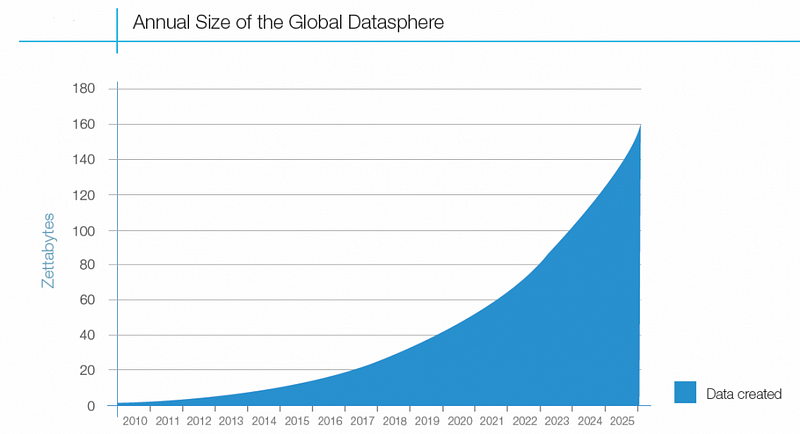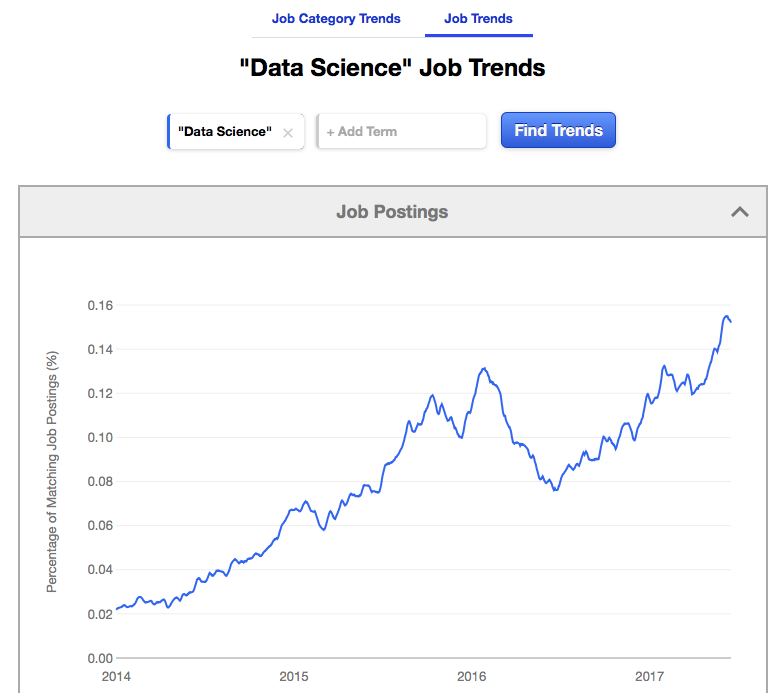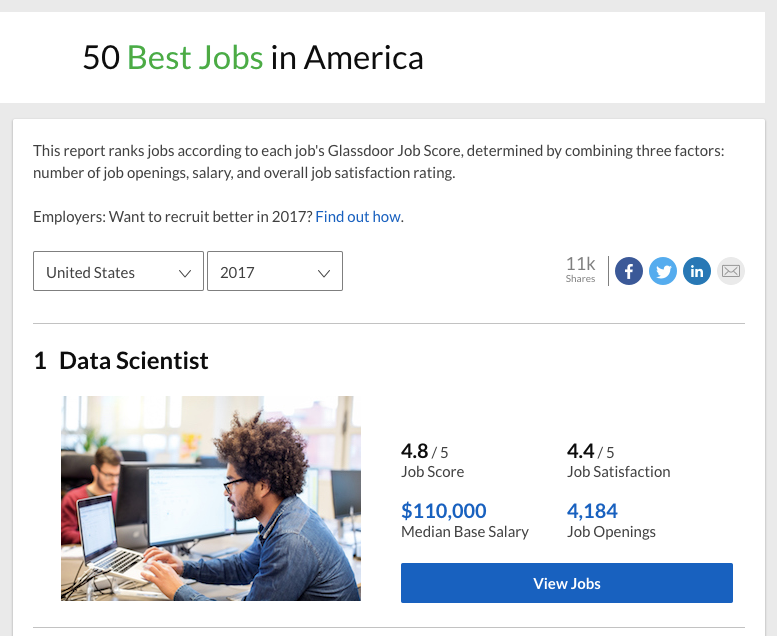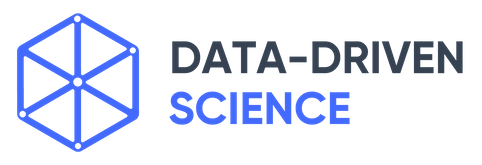Introduction
First, what does Data Science actually mean? It is a field of Big Data and seeks to provide meaningful information and insights from large amounts of complex data. Data Science combines statistics and computation in order to interpret data for solving business problems and making better decisions. Companies in industries such as finance, healthcare, retail, or internet employ Data Scientists to use their data effectively.
Information & Data Explosion
Data is one of the most valuable assets today, and we live in a world that is generating an enormous amount of it. Not only is data getting even more each year, but the rate at which data is being generated is accelerating. The following graph illustrates the increasing volume. The global amount of data created will jump from 16 Zettabytes in 2017 to 160 Zettabytes in 2025, according to a IDC report.

Source: IDC’s Data Age 2025 study, sponsored by Seagate, March 2017
Here’s a breakdown to make the number a little more tangible: 1 Zettabyte = 1 Thousand Exabytes = 1 Million Petabytes = 1 Billion Terabytes = 1 Trillion Gigabytes. Or to place that amount of volume in more practical terms, an Exabyte equals to approximately 36,000 years worth of HD quality video, and a Zettabyte is thousand times as much. It’s mind-boggling, and the massive amount of information will certainly affect people, organizations, and society. Therefore, it’s essential to learn how to cope with data and extract value from it.
Let’s look what causes the explosion of data:
- Expanding use of the internet and world wide web from people around the globe.
- Increasing number of users with access to computing power and bandwidth.
- Interaction of users with online applications such as video, gaming, or file sharing.
- Growth of social networks, e.g. Facebook, Twitter, LinkedIn, WhatsApp, Instagram.
- Shift towards online advertising and creation of specific content for online purposes.
- Internet of Things (IoT): Everyday objects collect, process and exchange data.
- Mobile technologies change the way to live, work, travel, shop, and stay connected.
The explosion of data & information is inevitable, so how do different industries deal with the opportunity?
Data Science in the Real World
It’s fair to say that most companies have adopted data science to execute the business strategy and run business operations. Primary goals are mostly around customer experience, cost reduction, marketing and making processes more efficient. Here are a few examples of how certain industries leverage data to their advantage.
Finance
There’s a flood of financial data including real-time market feeds, social media activity, mobile interactions, customer service records, transaction details; and the list goes on. For example, Data Scientists in the finance industry use Sentiment Analysis (aka opinion mining) to discover what people really think. Another application is Automated Risk Credit Management to gauge whether someone is creditworthy. And fighting financial fraud is also an area where data science can make a positive impact.
Healthcare
The healthcare industry generates large amounts of data, however, it is overpriced and inefficient; particularly in the United States. Data Science can be a rescue as it has the potential to help physicians make better decisions — from personalized treatments to preventive care. Especially the latter could help to slash costs significantly. Furthermore, it can help to analyze genomic data, leverage public health data and process records of past treatments.
Internet
Internet companies are in a strong position to take advantage of data science. Data is already in a digital format available, and there’s just a lot of it (Facebook generates 4 Petabytes of data per day, 2016). There are opportunities in marketing, cross-selling, customized offers, or personalized products; the possibilities are endless. Customer data is being accumulated like never before, and users receive offers depending on buying patterns, search histories, and behavioral analysis.
Pharmaceutical
The pharmaceutical industry is being haunted by high product failure rates. Only three out of every 20 approved drugs bring in enough revenue to cover developmental costs, and only one out of every three approved drugs can create enough income to cover the development costs of prior failures. Low ‘discovered compound’ to ‘approved drug’ ratio, and the high costs of research characterizes this industry. However, Data Science can help to reduce risks by predicting future trends, improving marketing practices, and bettering research.
Insurance
This industry benefits from more available data than ever before: social media, website analytics, smart phones, CCTV footage, satellite data, among others. Based on rich consumer information and behavior, insurance companies use data science to predict trends, improve pricing policies, offer personalized products, and better customer relationships. For example, through combining analytical applications with real-time data, companies are able to create detailed and personalized assessments of risk.
Job Market for Data Scientists
Harvard Business Review famously coined Data Science as the sexiest job of the 21st century (link to article). Not sure whether any job can be called sexy, however, the catchy phrase has helped to raise awareness for that profession. And actually, Data Scientists are in higher demand than ever. There’s a clear shortage of candidates with relevant knowledge and experience compared to the demand from companies that want to make use of their data.
Take a look at Indeed’s job trends regarding Data Science. It’s a “bull market”. The number of job postings is steadily growing despite small dips along the way. And there’s a strong case that this trend will continue. As mentioned before, the amount of data is rapidly increasing, and companies need people who can analyze it to drive business value.

Source: Indeed Job Trends
Glassdoor provides yearly job market reports based on insights generated by its users. In 2016 and 2017, Data Scientist jobs have reached the top of Glassdoor’s Best Jobs in America list. And although, the ranking is focused on the U.S. job market, one can assume that Data Science is sought-after across the world.

Source: Glassdoor, 50 Best Jobs in America
And last not but not least, IBM predicts that annual demand for the fast-growing new roles of data scientist, data developers, and data engineers will reach nearly 700,000 openings in the United States by 2020. Also, the number of jobs for all U.S. data professionals will increase by 364,000 openings to 2,720,000 (link to article). IBM urges to close the existing skills-gap; otherwise, businesses won’t be able to fill all open positions.
In conclusion, the amount of data is increasing at an unprecedented pace and accelerating, and companies in various industries take advantage of the flood of information to drive insights and value to the business. The role of Data Scientists become more and more important, and perhaps the label of the sexiest job of the 21st century is actually not that bad 🙂

